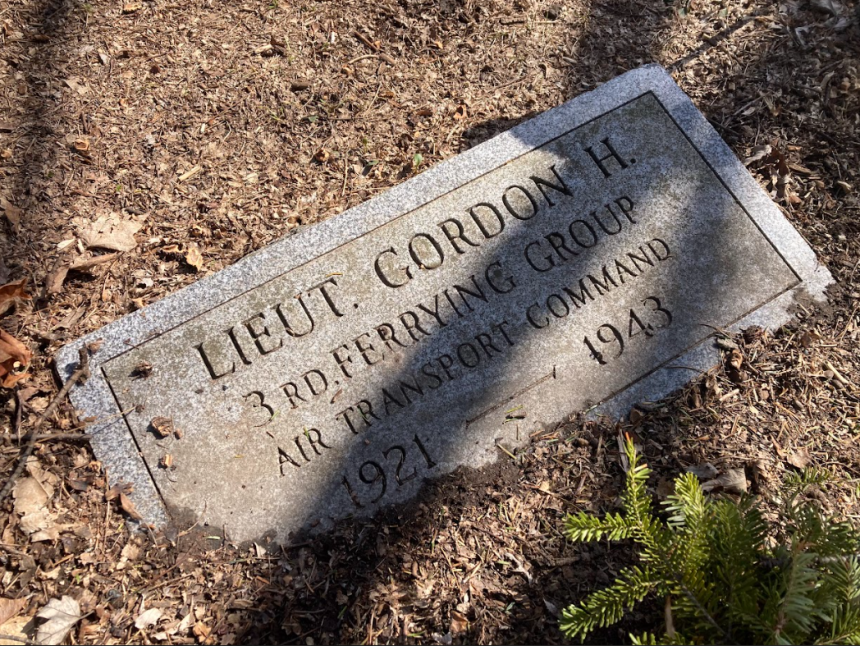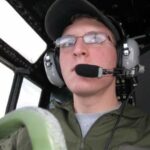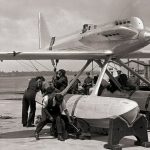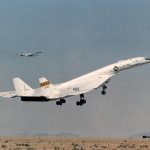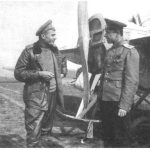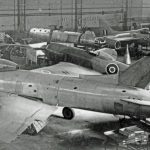World War II was a conflict of epic proportions, marked by extraordinary feats of courage, staggering production numbers, and immense sacrifice. During the war, 16,776 P-51 Mustangs were built to support the Allied effort—a testament to the scale and urgency of the time. As we study this global conflict, it’s easy to focus on front-line battles and combat heroes. But often overlooked are those who served and sacrificed away from the battlefield—men and women whose efforts were equally vital to victory. One such individual was 2nd Lieutenant Gordon Howland Root.

Born on April 17, 1921, to Arthur and Blanche Root of Victor, New York, Gordon grew up just outside Rochester with a fascination for aviation. His father worked at Bell Aviation in nearby Buffalo, an influence that surely fueled Gordon’s passion for flight. After graduating at the top of his class from Victor High School in 1938, he briefly worked on the family farm while planning his future. Aircraft frequently soared overhead, reinforcing his desire to be part of the aviation world. He later enrolled at Alfred University for two years before taking the leap toward his dream. In 1941, Gordon enrolled at Page Airways, a flight school and flying service at Rochester Airport. The school was part of the U.S. Government’s Civilian Pilot Training Program (CPTP)—an initiative to prepare civilian pilots for potential military service as tensions in Europe escalated. Gordon trained at just the right moment, as demand for skilled pilots surged. His talent and demeanor quickly earned the respect of instructors and peers. As one associate recalled, “We considered him one of our best pilots. He was always free and easy, and nothing bothered him. He was a very intelligent man and an excellent instructor.” After completing CPTP and later U.S. Army Air Corps training, Lt. Root was assigned to the 60th Ferrying Squadron of the 3rd Ferrying Group, responsible for transporting aircraft across the United States to ports of embarkation for overseas deployment.
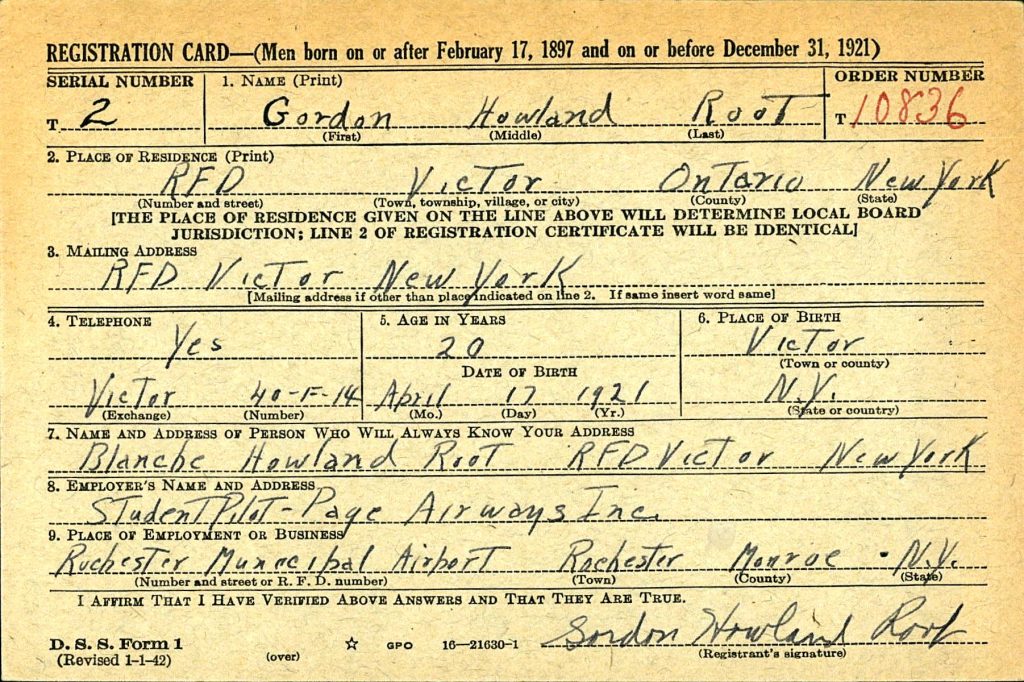
On November 26, 1943, Lt. Root was tasked with ferrying a P-51B-5-NA Mustang, serial number 43-6529, from Niagara Falls, New York to Newark, New Jersey, where it would be shipped to the European theater. En route, Root made a short stop at Rochester Airport to visit his family—a familiar gesture during previous ferry flights, when he often circled above his parents’ home in Victor. After a brief reunion, Lt. Root resumed his mission. At approximately 1500 Eastern War Time, he took off from Rochester Airport. Moments later, he made a low pass over the airfield, wagging his wings in a fond farewell. Tragically, disaster struck almost immediately. Witnesses reported that the aircraft became unstable and a section of the tail—later identified as part of the horizontal stabilizer—detached mid-flight, landing on a nearby golf course.
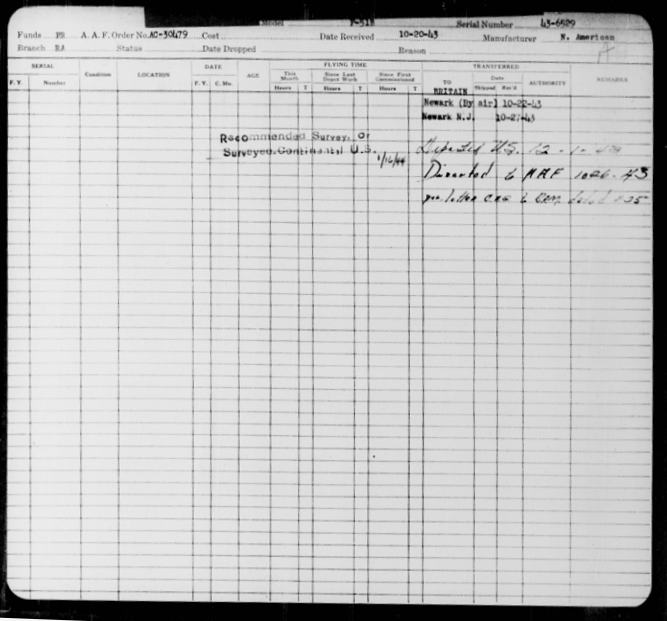
With limited altitude, high speed, and compromised control, Root fought to maintain control of the Mustang. Eyewitnesses were awed by his skill as he narrowly avoided power lines and attempted to land in a nearby field. Papers were seen flying from the cockpit—among them, his wallet, later recovered near the crash site. Despite his best efforts, the aircraft crashed on Crittenden Road, near the airport. It burst into flames upon impact. Local residents rushed to the scene, but the fire was too intense. Lt. Root, trapped in the cockpit, could not be saved. The official U.S. Army Air Forces accident report confirmed that the horizontal stabilizer’s failure caused a catastrophic loss of control.
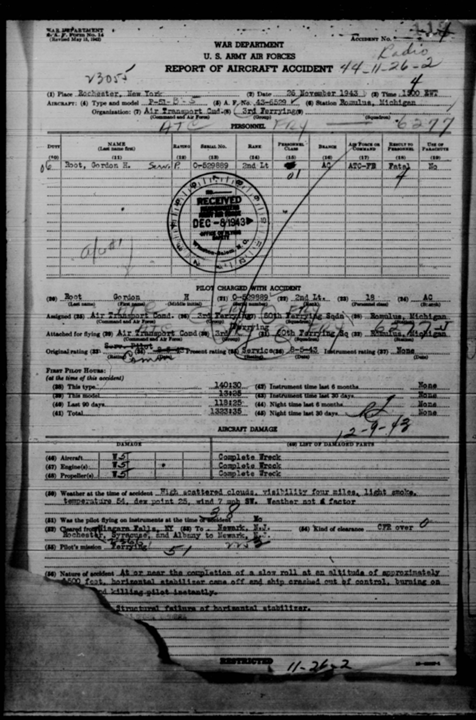
Lt. Gordon Root died that day in service to his country—not on the front lines, but fulfilling a mission critical to the success of those who were. The aircraft he was ferrying may well have contributed to Allied efforts had it reached the European front. His remains now rest at Boughton Hill Cemetery in his hometown of Victor, New York. His story is one of quiet heroism—of duty performed away from the spotlight, but no less vital. In the face of imminent disaster, Root fought to save his aircraft and the lives of those on the ground. His courage and commitment live on, and his sacrifice will not be forgotten. The P-51 ‘Lucy Gal’ Project, previously featured in this publication, plans to honor Lt. Root’s legacy alongside fellow Rochester native and Mustang pilot F/O Leland ‘Sticks’ Pennington. As we reflect on World War II, let us remember all who served—not just those in combat, but those whose behind-the-scenes efforts kept the war machine running. Lt. Gordon Root’s story is a powerful reminder that every role matters in the fight for freedom and peace. We will not forget.

Commercial Pilot, CFI, and Museum Entrepreneur, with a subject focus on WWII Aviation. I am dedicated to building flight experience so I can fly WWII Fighters, such as the P-51 Mustang, for museums and airshows, and in the USAF Heritage Flight. I lead and run the Pennington Flight Memorial, to honor local MIA Tuskegee Airman F/O Leland “Sticky” Pennington.







